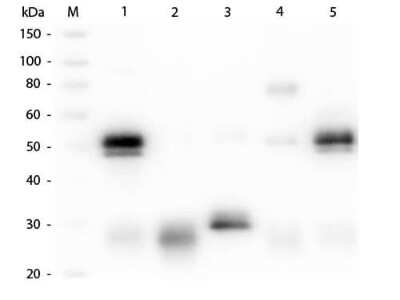Goat anti-Rabbit IgG (H+L) Secondary Antibody [Alkaline Phosphatase] (Pre-adsorbed)
Novus Biologicals, part of Bio-Techne | Catalog # NB120-6024


Conjugate
Catalog #
Forumulation
Catalog #
Key Product Details
Species Reactivity
Rabbit
Applications
ELISA, Immunohistochemistry, Western Blot
Label
Alkaline Phosphatase
Antibody Source
Polyclonal Goat IgG
Format
Pre-adsorbed
Concentration
Please see the vial label for concentration. If unlisted please contact technical services.
Product Specifications
Immunogen
Rabbit IgG whole molecule
Specificity
This antibody was pre-adsorbed against Bovine, Chicken, Goat, Guinea Pig, Hamster, Horse, Human, Mouse, Rat, and Sheep Serum Proteins. No reaction was observed against Bovine, Chicken, Goat, Guinea Pig, Hamster, Horse, Human, Mouse, Rat and Sheep Serum Proteins.
Clonality
Polyclonal
Host
Goat
Isotype
IgG
Description
Store secondary antibody at 4C before opening. DO NOT FREEZE. Alkaline Phosphatase conjugated antibodies are stable at 4C as an undiluted liquid. Dilute only prior to immediate use. Freezing alkaline phosphatase conjugates will result in a substantial loss of enzymatic activity.
This product was prepared from monospecific antiserum by immunoaffinity chromatography using Rabbit IgG coupled to agarose beads followed by solid phase adsorption(s) to remove any unwanted reactivities. Assay by immunoelectrophoresis resulted in a single precipitin arc against anti-Alkaline Phosphatase (calf intestine), anti-Goat Serum, Rabbit IgG and Rabbit Serum
This product was prepared from monospecific antiserum by immunoaffinity chromatography using Rabbit IgG coupled to agarose beads followed by solid phase adsorption(s) to remove any unwanted reactivities. Assay by immunoelectrophoresis resulted in a single precipitin arc against anti-Alkaline Phosphatase (calf intestine), anti-Goat Serum, Rabbit IgG and Rabbit Serum
Scientific Data Images
Western Blot: Goat anti-Rabbit IgG (H+L) Secondary Antibody [Alkaline Phosphatase] (Pre-adsorbed) [NB120-6024] - Western Blot of Unconjugated Goat anti-Rabbit IgG (H+L) Secondary antibody [Alkaline Phosphatase] (Pre-adsorbed). Lane M: 3 ul Molecular Ladder. Lane 1: Rabbit IgG whole molecule. Lane 2: Rabbit IgG F(ab) Fragment. Lane 3: Rabbit IgG F(c) Fragment. Lane 4: Rabbit IgM Whole Molecule. Lane 5: Normal Rabbit Serum. All samples were reduced. Load: 50 ng per lane. Block for 30 min at RT. Primary Antibody: Goat anti-Rabbit IgG (H+L) Secondary antibody [Alkaline Phosphatase] (Pre-adsorbed) 1:1,000 for 60 min at RT. Secondary antibody: Anti-Goat IgG (DONKEY) Peroxidase Conjugated Antibody 1:40,000 in blocking buffer for 30 min at RT. Predicted/Obsevered Size: 25 and 50 kDa for Rabbit IgG and Serum, 25 kDa for F(c) and F(ab), 70 and 23 kDa for IgM. Rabbit F(c) migrates slightly higher.
Goat anti-Rabbit IgG (H+L) Secondary Antibody [Alkaline Phosphatase] (Pre-adsorbed)
Western Blot of Goat anti-Rabbit IgG (H+L) Secondary Antibody [Alkaline Phosphatase] (Pre-adsorbed)Applications
Application
Recommended Usage
ELISA
1:10000 - 1:50000
Immunohistochemistry
1:200 - 1:1000
Western Blot
1:500 - 1:2500
Application Notes
This secondary antibody are ideal for Western Blotting, Immunohistochemistry, ELISA as well as other antibody detection methods.
Formulation, Preparation, and Storage
Purification
Multi-step
Formulation
0.05 M Tris Chloride, 0.15M Sodium Chloride, 0.001M Magnesium Chloride, 0.0001M Zinc Chloride, 50% (v/v) Glycerol; pH 8.0, 10 mg/mL Bovine Serum Albumin (BSA) - Immunoglobulin and Protease free
Format
Pre-adsorbed
Preservative
0.1% Sodium Azide
Concentration
Please see the vial label for concentration. If unlisted please contact technical services.
Shipping
The product is shipped with polar packs. Upon receipt, store it immediately at the temperature recommended below.
Stability & Storage
Store at 4C. Do not freeze.
Background: IgG (H+L)
The 4 IgG subclasses, sharing 95% amino acid identity, include IgG1, IgG2, IgG3, and IgG4 for humans and IgG1, IgG2a, IgG2b, and IgG3 for mice. The relative abundance of each human subclass is 60% for IgG1, 32% for IgG2, 4% for IgG3, and 4% for IgG4. In an IgG deficiency, there may be a shortage of one or more subclasses (4).
References
1. Painter RH. (1998) Encyclopedia of Immunology (Second Edition). Elsevier. 1208-1211
2. Chapter 9 - Antibodies. (2012) Immunology for Pharmacy. Mosby 70-78
3. Schroeder H, Cavacini, L. (2010) Structure and Function of Immunoglobulins. J Allergy Clin Immunol. 125(2 0 2): S41-S52. PMID: 20176268
4. Vidarsson G, Dekkers G, Rispens T. (2014) IgG subclasses and allotypes: from structure to effector functions. Front Immunol. 5:520. PMID: 25368619
Additional IgG (H+L) Products
Product Specific Notices
This product is for research use only and is not approved for use in humans or in clinical diagnosis. Secondary Antibodies are guaranteed for 1 year from date of receipt.
Loading...
Loading...
Loading...
Loading...
![Goat anti-Rabbit IgG (H+L) Secondary Antibody [Alkaline Phosphatase] (Pre-adsorbed) Goat anti-Rabbit IgG (H+L) Secondary Antibody [Alkaline Phosphatase] (Pre-adsorbed)](https://resources.bio-techne.com/images/products/nb120-6024_goat-polyclonal-goat-anti-rabbit-igg-h-l-secondary-antibody-alkaline-phosphatase-pre-adsorbed-25520231313512.jpg)